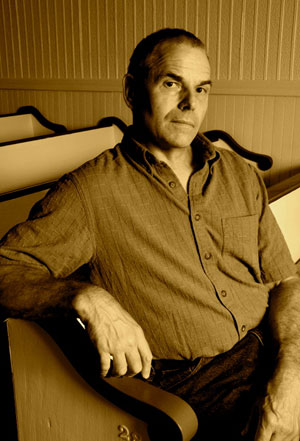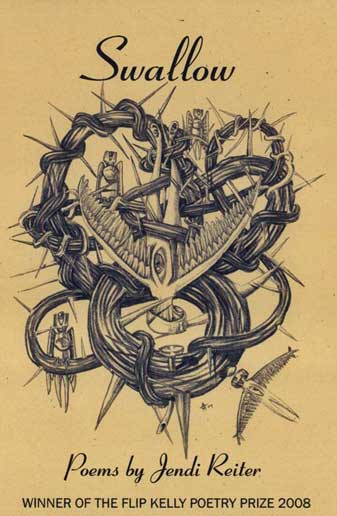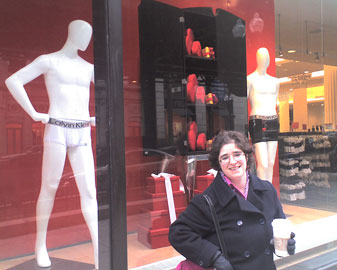Charlie Bondhus and I will be giving a poetry reading at 7:30 PM on Thursday, Jan. 14, at the Green Street Cafe, located at 64 Green Street (no surprise there) in Northampton, MA. This cozy neighborhood bistro cooks with home-grown herbs and vegetables; I recommend the Sri Lankan vegetable stew.
I’ll be reading some of my newer poems and selections from Swallow and A Talent for Sadness. Copies of these books will be on sale, along with my freshman effort, Miller Reiter Robbins: Three New Poets (Hanging Loose, 1990), which features a lovely picture of fierce 17-year-old me.
Charlie’s first full-length collection, How the Boy Might See It, was released last month by Pecan Grove Press. He kindly shares this poem from the book below. It exemplifies the combination of sensuality and spiritual depth that I appreciate in Charlie’s work.
His Sunday Morning Blues
Then the Lord God formed man out of the dust of the ground and breathed into his nostrils the breath of life, and man became a living being [and] the man knew Eve his wife.
-Genesis 2:7, 4:1
Woke up this
morning cold
kicked the
blankets last night
saw her gone
must’ve stolen out
with the boys
another gathering
lesson, though this time
didn’t wake me up
with a kiss and
touch on the head
like usual.
Don’t feel like checking the fields,
guess I’ll spend the day
in our camel hair bed
and hash this whole thing out.
Funny how
everything I remember before the
sand and the crag looks the way a deer
does, vague behind the gloss
of fog.
I do remember monkeys and mountain goats who
spoke in a voice
similar to our own;
toucans and thrushes that
screeched and warbled in
what must’ve been friendship;
a sense
that everything existed
indefinitely.
As for the woman, she
sometimes talks about tinctured
fruit, every color of a
blush, and uncured leaves–
of peppermint, thyme, rosemary–
something sharper, maybe wiser
that used to float
in the flavor of papayas and kiwis.
Also something more for her
in the sound of the river–
the entire streambed maybe
covered with flutes and shells,
rather than mud and papyrus.
These days though,
everything sounds and tastes
blurry as the dog looked
when we found him
at the bottom of the oasis,
as if we touch and eat
only the colored shadows
of grape, apple, grain–
as if life were lived
forever in twilight.
And still other things,
called to mind by
the branches of a tree–
something in the twist or
the pull, the sober tinge of
bark–
the slope of a leaf–
wondering whether the color is really
green or something that’s not quite
green and if
the edges are really as
pointed or smooth as they
appear.
The gravid clouds that shuffle,
dazed and vapid,
like the feet of an aging God,
across a monotonous sky,
wondering whether or not one could tear
their flimsy substance
between hands or teeth.
Always too, those objects that we
cannot see but still perceive more
readily than rocks and sand,
many of which
I haven’t gotten around
to naming.
Sometimes the woman
cries and throws
herself on the bed
refuses to talk and
I know she’s in pain because
of the blood but we’ve both
cut ourselves before, like once
I tore open my shin on a rock while
climbing after a
goat, and she ripped open
the palms of her hands when she
lost her grip, attempting to pull up
a stubborn vegetable in the garden,
but both of us were still able to speak then
so I know that when she bleeds unbidden,
she must be
stuffed full of
one of those crazy compound things
that we fear
for their power, persistence, and
lack of a name, and that’s
what really hurts.
My greatest fears
stand taller than wheat
when the ground isn’t fertile,
the animals go into hiding, and we
take Cain and Abel,
move to a different place,
and the woman and I find
in each empty, unbreathing land,
no matter how distant,
that the unspoken
is a little more real.
I tremble at these times
when the truth looks the way
that apple grape and grain taste–
should we fall the way some
animals have, stricken by neither
stone nor spear, and the sand were to cover
the crops and the caves crumble to
soil, as they have in the lands we have left,
with no creature capable of maintaining things
as we have, would we be judged unworthy
to return to the place of
sharp taste, musical river, and speaking beast?


